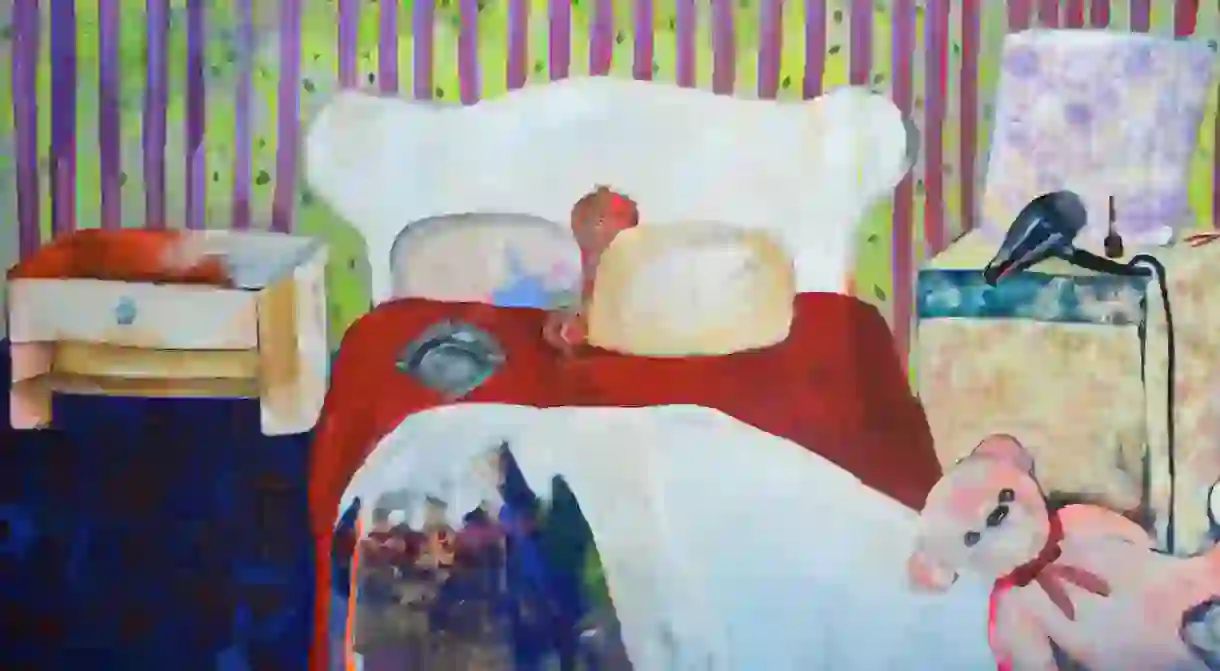Palestinian Artist Paints Bold And Colorful Intimate Spaces

Shying away from themes of war and conflict, Palestinian artist Rana Samara instead paints everyday life for women, men and children behind closed doors. You may not see the subjects, but it’s easy to get a sense of what they’ve been up to, and identify with the normalcy of their private lives. We spoke to Samara to learn more about her influences and the creative process behind her series, Intimate Space.
Rana, thank you for taking the time to speak with us about your work. Let’s start off with your background. Where are you from, and based?
I am from Ramallah but I’m now based in Chicago as I have been accepted into an MFA program (art and theory) at Northwestern University.
When did you initially begin painting? Which other artists have inspired you most?
I began painting in 2010 and many artists inspired me including Nabil Anani, David Hockney and Henri Matisse.

Many other notable Palestinian artists have focused on the Israeli-Palestinian conflict, yet you’ve veered away from it. Instead, numerous other themes pervade your work: gender roles, sexuality, social and cultural taboos. Where does your interest in these themes stem from?
Women, gender and sexual relations comprise the backbone of my work. It all started after a walk in Al-Amari Refugee Camp where I began wondering about the sex lives of couples living in such condensed spaces that afford them almost no privacy. This privacy is especially difficult to achieve considering the large size of most Palestinian families and the cramped proximity in which neighbors and families live. In my research I investigate the social contexts of sexuality in which I rely mostly on my personal relations with various women I met. I have intimate and continuous conversations with them about virginity, intimacy, sexual desire, gender norms, their convictions and relationships and roles vis à vis the younger generations. These conversations form the cornerstone of my research for my practice in which I utilize various forms including painting, video, installation and also embroidery. My practice currently focuses on painting, both for the potential of the medium as well as its historical references and contexts.

Tell us about Intimate Space. What is the main focus of this body of work?
My current body of work focuses on the question of women’s bedrooms, which reflect a woman’s social class, sexual life, the amount of privacy she has and at times can even resemble a crime scene. I explore the question of where we are positioned as viewers to these rooms and how through voyeuristically intruding on the scene we are able to sense the lives of the women who inhabit and express their sexuality in these rooms and the relationship between place and social norms. Currently I am working on a body of work which focuses on the question of virginity. As Palestinian society is predominantly conservative, virginity is extremely important and proof of it is still sought by the groom’s family. This proof usually takes the form of a blood stained handkerchief that is shown to the women in the family after the wedding night. For this project I gave 50 handkerchiefs to different men and women and asked them to embroider upon them their views and understanding of this longstanding tradition. Working across different mediums and forms enables me to explore intimate and taboo questions of female sexuality in my society.


How did you conceptualize Intimate Space?
I always wonder what kind of intimate situations are born in a space and how many stories there are to share and I am keen to explore how this manifests in different places, contexts and corners of public space.
Your paintings are saturated with bright colors, a style which contrasts with the usual ‘darkness’ of conservative notions of intimacy. Why did you decide to create such colourful pieces?
Because I love bright and strong colors and I focus on layers in my work. I also love stenciling.

Women aren’t depicted in your paintings, yet womanhood does seem particularly significant in your work. Why is that?
Because I focus on the intimate space itself and the evidences] of sexual relationships that appear in the painting. Each painting tells a story and the viewer can imagine the woman and the man but they do not get to see them.
Do you have any other upcoming projects?
For now I’m only thinking of my education and on experimenting with different mediums.

For more information on Rana Samara and Zawyeh Gallery, please visit http://zawyeh.net/.













